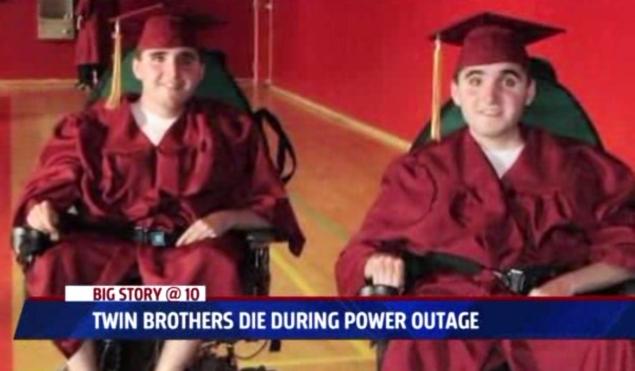In Northern California’s Calaveras County last night, twin brothers Ryan Hall and Joshua Hall died during a local power outage. The two 22-year-old brothers were ventilator dependents and the early investigation revealed that their respective ventilators’ back-up system systems failed when the house lost power.
 Ryan and Joshua Hall suffered from muscular dystrophy and relied on their ventilator to breathe for them. Sheriff Gary Kuntz told reporters that the investigation is focused on the reasons why the backup systems failed.
Ryan and Joshua Hall suffered from muscular dystrophy and relied on their ventilator to breathe for them. Sheriff Gary Kuntz told reporters that the investigation is focused on the reasons why the backup systems failed.
This tragic incident is eerily similar to a case Leesfield & Partners recently handled and successfully resolved after almost three years of litigation, and a $2.5 million wrongful death settlement was reached for the parents and sole caretakers of the 31 year-old man who died.
The young man in question had courageously defied all expectations, outliving the early prognosis of most doctors, only to die needlessly when his ventilator failed in the middle of the night during a power outage. The ventilator’s backup internal battery lasted less than 10 minutes that night and did not adequately sound its alarm to alert his sleeping parents.
Leesfield & Partners filed a lawsuit against the manufacturer of the ventilator and the respiratory therapist and his company who owned and maintained the ventilator. Discovery revealed that the internal battery was expired and the ventilator itself had manufacturing and design defects. The manufacturer of the ventilator had received hundreds of complaints over approximately a 10-year period involving this specific ventilator model not performing to specifications.
After exhaustive research into the company’s history, it became clear that the manufacturer had systemic problems and failed to comply with FDA standards which contributed to the internal power and alarm problems. A confidential settlement was reached with the manufacturer.
In addition to the defects, the respiratory therapy company, was negligent in its duties and failed to provide regular and preventive maintenance on the ventilator. Most significantly the company failed to ensure that the ventilator receive a new internal battery after the prescribed time. The respiratory therapy company also ignored FDA recalls regarding the internal power and alarms problems and falsified maintenance records. Facing an imminent trial date and a claim for punitive damages, the respiratory therapy company settled this case.
As a result of litigation led by our Miami personal injury lawyer, the manufacturer implemented several policy changes at its facility including the improvement of corrective action, preventive action protocol, data collection, reporting methods and FDA compliance. It has indicated that recent recalls have finally addressed the defects and the medical device is now safer.
 Florida Injury Lawyer Blawg
Florida Injury Lawyer Blawg


